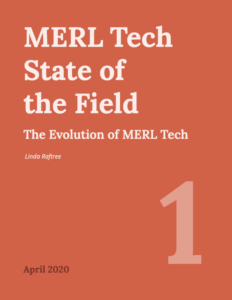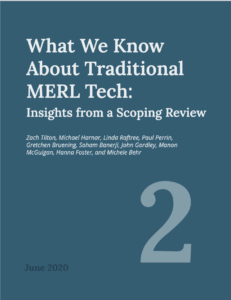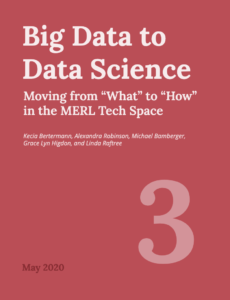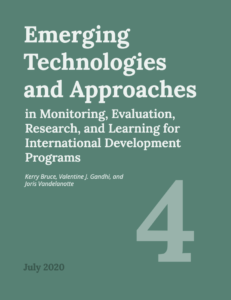New Research! The State of the Field of MERL Tech, 2014-2019
The year 2020 is a compelling time to look back and pull together lessons from five years of convening hundreds of monitoring, evaluation, research, and learning and technology practitioners who have joined us as part of the MERL Tech community. The world is in the midst of the global COVID-19 pandemic, and there is an urgent need to know what is happening, where, and to what extent. Data is a critical piece of the COVID-19 response — it can mean the difference between life and death. And technology use is growing due to stay-at-home orders and a push for “remote monitoring” and data collection from a distance.
At the same time, we’re witnessing (and I hope, also joining in with) a global call for justice — perhaps a tipping point — in the wake of decades of racist and colonialist systems that operate at the level of nations, institutions, organizations, the global aid and development systems, and the tech sector. There is no denying that these power dynamics and systems have shaped the MERL space as a whole, and the MERL Tech space as well.
Moments of crisis tend to test a field, and we live in extreme times. The coming decade will demand a nimble, adaptive, fair, and just use of data for managing complexity and for gaining longer-term understanding of change and impact. Perhaps most importantly, in 2020 and beyond, we need meaningful involvement of stakeholders at every level and openness to a re-shaping of our sector and its relationships and power dynamics.
It is in this time of upheaval and change that we are releasing a set of four papers that aim to take stock of the field from 2014-2019 as launchpad for shaping the future of MERL Tech. In September 2018, the papers’ authors began reviewing the past five years of MERL Tech events to identify lessons, trends, and issues in this rapidly changing field. They also reviewed the literature base in an effort to determine what we know, what we yet need to understand about technology in MERL, and what are the gaps in the formal literature. No longer is this a nascent field, yet it is one that is hard to keep up with, given that it is fast paced and constantly shifting with the advent of new technologies. We have learned many lessons over the past five years, but complex political, technical, and ethical questions remain.
The State of the Field series includes four papers:
 MERL Tech State of the Field: The Evolution of MERL Tech: Linda Raftree, independent consultant and MERL Tech Conference organizer.
MERL Tech State of the Field: The Evolution of MERL Tech: Linda Raftree, independent consultant and MERL Tech Conference organizer.
 What We Know About Traditional MERL Tech: Insights from a Scoping Review: Zach Tilton, Michael Harnar, and Michele Behr, University of Western Michigan; Soham Banerji and Manon McGuigan, independent consultants; and Paul Perrin, Gretchen Bruening, John Gordley and Hannah Foster, University of Notre Dame; Linda Raftree, independent consultant and MERL Tech Conference organizer.
What We Know About Traditional MERL Tech: Insights from a Scoping Review: Zach Tilton, Michael Harnar, and Michele Behr, University of Western Michigan; Soham Banerji and Manon McGuigan, independent consultants; and Paul Perrin, Gretchen Bruening, John Gordley and Hannah Foster, University of Notre Dame; Linda Raftree, independent consultant and MERL Tech Conference organizer.
Big Data to Data Science: Moving from “What” to “How” in the MERL Tech Space: Kecia Bertermann,  Luminate; Alexandra Robinson, Threshold.World; Michael Bamberger, independent consultant; Grace Lyn Higdon, Institute of Development Studies; Linda Raftree, independent consultant and MERL Tech Conference organizer.
Luminate; Alexandra Robinson, Threshold.World; Michael Bamberger, independent consultant; Grace Lyn Higdon, Institute of Development Studies; Linda Raftree, independent consultant and MERL Tech Conference organizer.
 Emerging Technologies and Approaches in Monitoring, Evaluation, Research, and Learning for International Development Programs: Kerry Bruce and Joris Vandelanotte, Clear Outcomes; and Valentine Gandhi, The Development CAFE and Social Impact.
Emerging Technologies and Approaches in Monitoring, Evaluation, Research, and Learning for International Development Programs: Kerry Bruce and Joris Vandelanotte, Clear Outcomes; and Valentine Gandhi, The Development CAFE and Social Impact.
Through these papers, we aim to describe the State of the Field up to 2019 and to offer a baseline point in time from which the wider MERL Tech community can take action to make the next phase of MERL Tech development effective, responsible, ethical, just, and equitable. We share these papers as conversation pieces and hope they will generate more discussion in the MERL Tech space about where to go from here.
We’d like to start or collaborate on a second round of research to delve into areas that were under-researched or less developed. Your thoughts are most welcome on topics that need more research, and if you are conducting research about MERL Tech, please get in touch and we’re happy to share here on MERL Tech News or to chat about how we could work together!
You might also like
-
What’s happening with GenAI Ethics and Governance?
-
Join the AI and African Evaluation Working Group Meet ‘n’ Mix Session on May 7!
-
Hands on with GenAI: predictions and observations from The MERL Tech Initiative and Oxford Policy Management’s ICT4D Training Day
-
When Might We Use AI for Evaluation Purposes? A discussion with New Directions for Evaluation (NDE) authors